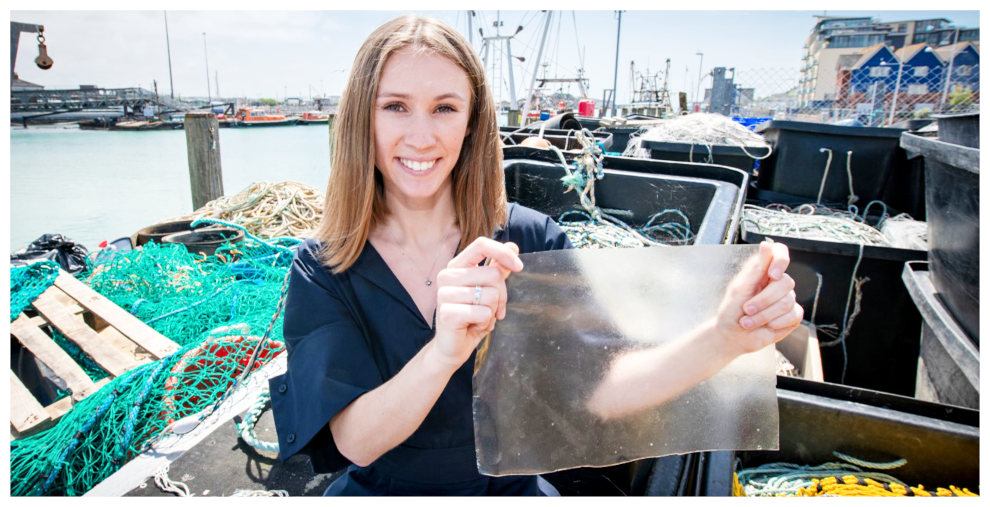
Plastics waste is a major global problem facing the planet, affecting life on earth both on land and in the sea. The problem is that it is non-biodegradable and can exist in the ecosystem for hundreds of years, damaging both animal and human life and the ecosystem. So pervasive is it that global society is producing circa 380 million tons of plastic each year, 90 per cent of which is not recycled, while 8 million pieces of plastic end up in our oceans every day. If this trend continues, it is predicted that by 2050 there will be more plastic in the sea by weight than there are fish.
Such stark facts and figures have brought a realisation that more needs to be done. To date, HES has shared several efforts to find alternatives (e.g. Notpla, Swedish Stockings and Billi London), to recycle (GjengevMakers, TCG) and to offset plastics (Tred). One further novel example has been developed by Lucy Hughes, a young Industrial and Product design graduate of the University of Sussex. After graduating in 2019 with a First Class Honours degree, Lucy launched MarinaTex in February 2020. Based on her final year project MarinaTex is a home compostable translucent bioplastic material that could replace single-use plastic and help resolve the global problem of plastic pollution. It is made from fish waste, preferably skin and scales, of which there is some 50 million tons produced globally each year, most ending up in landfill and/or burned. Working in her home kitchen, it took her 100 experiments to refine both the process and the product, which has a higher tensile strength than low-density polythene (LPDE) of the same thickness.

So innovative is the product that Lucy has won various regional, national and international awards, including the James Dyson International Design Award, for which she received a £30,000 prize. With R&D testing costing as much as £20,000 per test, one of the problems she faces is the need to raise funding. At this stage in the venture’s development, reluctant to seek equity financing, Lucy is considering her business model and route to market – does she manufacture the end product or the machinery that produces it? In the process, she is teaming up with other like-minded designers as the problem ( of plastics waste) is, as she says, “bigger than us“.
Before going into production, whether of the end product or the machinery, much preparation is needed, including securing full legal protection, the acquisition of certifications and more research into the product’s performance under different conditions. “Further research and development will ensure that MarinaTex evolves further, and I hope it becomes part of a global answer to the abundance of single-use plastic waste,” says James Dyson. Whilst agreeing with him, perhaps we need to ask why science has produced an artificial product that is damaging the planet while a young design student is creating something that could save it and address the other global problem of how to dispose of fish waste. Indeed, “Why do we need to have hundreds of man-made polymers when nature has so many readily available?” asks Lucy. She was only able to invent an alternative to plastic due to the questions she asked and, as she says, “I think it comes from a place of wanting to protect our oceans and planet”.
Most certainly, entrepreneurship will not address the sustainability challenge by just asking how it can make “as much money as possible“. It needs to focus also, as MarinaTex has done, on the inter-connected non-economic social and environmental issues that constitute the challenge. While MarinaTex is focusing on SDGs 14 (Life below Water) and 15 (Life on Land), it is also contributing to SDGs 9 (Industry, Innovation and Infrastructure) and 12 (Responsible Consumption and Production) while implementing SDG 17 (Partnerships to achieve the Goal). Eventually, it will be required to contribute, also, to SDG 8 (Decent Work and Economic Growth), generating wealth for the venture and the country and providing employment for Lucy and her employees.
The answer to the question “how can enterprises make as much money as possible?” needs to be “by embedding their activities in ethical custom and ensuring all profit-making is in harmony with people and planet”.
When this occurs, then “All things under the sun will flourish when harmony prevails”.
© Professor David A. Kirby and Harmonious-Entrepreneurship.org (2021). Unauthorized use and/or duplication of this material without express and written permission from the author is strictly prohibited. Excerpts and links may be used, provided that full and clear credit is given to Professor David A. Kirby and Harmonious-Entrepreneurship.org with appropriate and specific direction to the original content.



3 comments